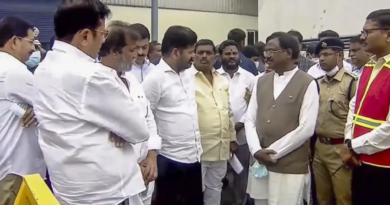IRRIGATION BOOST IN TELANGANA
Telangana’s irrigation sector is set for a significant push as Irrigation Minister N. Uttam Kumar Reddy has announced an accelerated approach to completing and optimizing key lift irrigation projects in the state. Addressing a review meeting, the Minister underlined the urgency of fast-tracking the Jalaput Canal-based Ranganayaka Devadula Lift Irrigation Scheme (JCRDLIS) a lifeline project that irrigates approximately 5.57 lakh acres and plays a vital role in meeting the drinking water requirements of rural areas.
The Devadula Lift Scheme, one of the largest lift irrigation projects in India, was conceptualized to draw water from the Godavari river during the monsoon season and lift it in multiple stages to drought-prone districts. Over the years, this project has been instrumental in transforming previously arid farmlands into fertile zones, enabling farmers to cultivate two crops a year. However, certain phases and distribution networks are still pending completion, prompting the Minister to set clear deadlines for execution and warning officials against unnecessary delays.
In a significant development, the Minister also inaugurated the Jawahar Lift Irrigation Scheme (Jawahar LIS), aimed at irrigating 33,000 acres of agricultural land. This project is expected to directly benefit farmers in remote regions who have long relied on erratic rainfall. By ensuring a steady and reliable water supply, Jawahar LIS is anticipated to improve crop yields, diversify agricultural production, and strengthen rural livelihoods.
Emphasis on Rural Water Supply
Beyond agriculture, the Minister emphasized the importance of these irrigation schemes in enhancing rural drinking water supply. Many villages in Telangana face seasonal water shortages, particularly during summer months. By integrating rural drinking water pipelines with lift irrigation systems, the state aims to ensure that communities have access to clean, safe water throughout the year. This integration is part of a broader vision to make irrigation infrastructure multi-purpose, serving both farmers and households.
Telangana’s Firm Stand on Krishna River Waters
During his address, Minister Uttam Kumar Reddy also touched on the politically sensitive issue of Krishna River water allocation. Telangana has been in a long-standing dispute with neighboring Andhra Pradesh over water sharing, particularly concerning projects along the Krishna basin. The Minister reiterated that Telangana’s claim for a fair share of Krishna waters is both legally and technically strong, countering criticisms from the Bharat Rashtra Samithi (BRS), the main opposition party in the state.
According to the Minister, Telangana’s stance is backed by historical usage patterns, hydrological studies, and the principle of equitable distribution. He argued that the state has made efficient use of its allocations while also investing heavily in irrigation infrastructure to ensure maximum utilization of its share. The government has pledged to defend these claims in both administrative negotiations and legal forums, ensuring that Telangana’s farmers are not deprived of their rightful share.
Linking Irrigation with Economic Growth
The government views these irrigation initiatives not merely as infrastructure projects but as engines of rural economic transformation. By bringing more farmland under assured irrigation, farmers can shift from low-value, rain-dependent crops to higher-value, market-oriented agriculture. This shift has the potential to increase farm incomes, create agro-based employment opportunities, and reduce rural distress.
Moreover, assured irrigation allows for crop diversification, enabling the cultivation of vegetables, fruits, and commercial crops alongside staples like paddy and maize. Such diversification not only enhances food security but also strengthens the rural economy by creating new value chains in processing, storage, and marketing.
Challenges and Way Forward
While the announcements mark a positive step, challenges remain. Lift irrigation projects are energy-intensive, and ensuring uninterrupted power supply to pumping stations is crucial. Maintenance of canals, prevention of water losses through seepage, and modernization of distribution networks will also be key to maximizing the benefits.
The Minister has directed engineering teams to adopt modern technologies such as automated pump operation, remote monitoring, and real-time water management systems to improve efficiency. He also stressed the importance of community participation, urging local water user associations to take active roles in maintaining field channels and ensuring equitable distribution.
In the coming months, the focus will remain on speedy completion, transparent monitoring, and accountability in project execution. If implemented effectively, these irrigation boosts could mark a turning point for Telangana’s agriculture, rural water security, and overall economic resilience.




